PROVINCETOWN — A 1,825-foot-long public walkway that will allow people to walk out to the tip of the Provincetown Marina has taken two steps forward after years of delays.
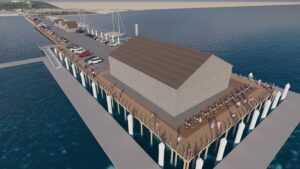
The harborwalk was first required by a state license granted to the Provincetown Marina’s new owners, Charles and Ann Lagasse, in December 2016. The state had required the harborwalk to be built by February 2022, but the $6-million project was delayed by the pandemic and other permitting challenges, Charles Lagasse told the Independent in November 2021.
After a Dec. 13, 2023 inspection by state regulators, the Lagasses gave the state Dept. of Environmental Protection (DEP) a “verbal commitment” last spring that they would proceed with the project.
On Oct. 21, 2024, the town’s conservation commission granted an updated “order of conditions” for the construction of the harborwalk, including protections for native species that live in the area. A “silt curtain” will be installed during construction to prevent sediment from burying the eelgrass beds west of the pier, and no silt-producing work can take place between Feb. 1 and June 30 to protect winter flounder that spawn in the harbor.
On Dec. 13, the DEP approved updated plans for the harborwalk, including the relocation of the central section of the walkway onto the pier itself to avoid shading eelgrass beds.
It is the state’s unusual Chapter 91 law, which dates from the colonial era and ensures public access rights in intertidal areas, that mandated the public walkway project in the first place.
The law requires that intrusions onto tidelands and waterways include public access provisions, and updated regulations from 1990 specifically require 10-foot-wide public walkways on piers, former Harbormaster Rex McKinsey told the Independent.
“If you look at where Bay State Cruise Company lands at the World Trade Center in Boston, there’s a wide walkway all the way around the structure,” McKinsey said. “It’s the same for a lot of other piers in Boston. It looks like they’re for service trucks, but they’re open to pedestrians, and they’re required by 310 CMR 9.52” — the DEP code on uses of shoreline.
One of the town’s major concerns in 2016 was avoiding any loss of public parking spaces at the pier, McKinsey said, which is why the town’s harbor plan called for the walkway to be cantilevered or built on new pilings rather than on the existing pier.
“That’s what made this project so much more expensive,” McKinsey said. “The cantilevering idea was to maintain as much parking as possible on the existing deck.”
The walkway will begin where the brick sidewalk on Ryder Street Extension ends, in front of the kite shop at 277A Commercial St. The first 70 feet will be made of concrete to allow the town’s DPW trucks to cross the walkway onto Ryder Street Beach for maintenance projects. After that, the walkway will transition to a wooden deck with railings, rise over a small dune near the 9 Ryder restaurant, and then head out over the water for about 500 feet.
As the harborwalk approaches the pier’s middle section near the marina’s office buildings, it will jog back onto the main part of the pier to avoid shading nearby eelgrass beds, project planner Erika Frazier told the conservation commission. This will result in the loss of 24 parking spaces, leaving a total of 186 spaces on the pier.
After that, the harborwalk will head back out over water and wrap around three sides of the large shed at the end of the pier, which has sat mostly vacant for years. In addition to the 10-foot-wide harborwalk, a 2,425-square-foot outdoor seating area will be built on two sides of that building — the southeast side that faces the harbor and the northeast side that faces MacMillan Pier.
Charles Lagasse told the conservation commission in August that the walkway would invite pedestrians at one of the busiest parts of Commercial Street — its intersection with Ryder Street near town hall — out to the waterfront.
“If people walking Commercial Street or Ryder Street see this continuous harborwalk, they’ll probably use it,” said Lagasse. “We think this promenade-type structure will be a legacy thing not only for Provincetown, but for us, too.”
Ann Lagasse told the Independent that “we think this will be a beautiful and significant addition to downtown Provincetown. We’re using ipe, a sustainable hardwood, for the base decking. This has been a long process, no question, but we’re excited about it.”
Why This Project?
At a series of conservation commission hearings in August and September, a few people wanted to know how the harborwalk had been conceived.
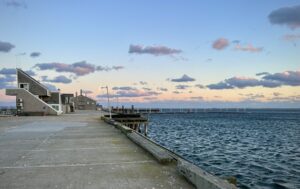
“This is being presented as a benefit to the town,” said commissioner Mark Adams. “Do we know that the town really needs this kind of hard structure there?”
At the Sept. 16 conservation commission meeting, harbor committee chair Michela Murphy read a letter from her committee asking state regulators to cancel the project.
“The committee suggests that the harborwalk stipulated in the Chapter 91 license may no longer be the most suitable use of public accommodation,” Murphy said. “In lieu of the harborwalk, we propose that the license holder consider adding a west-side dinghy dock to mitigate traffic in the ferry lane.”
Murphy also said there were a “growing number of seasonal and short-term visitors to town who are living on the water with limited access to amenities.” Her letter asked DEP regulators to require “the license holder to provide public shower facilities and a laundromat — substantial public benefits for harbor stakeholders.”
According to a 2008 Woods Hole Group report prepared for the property’s former owners, Robert and Vaughn Cabral, the pier — at that time called Fisherman’s Wharf — has been put to a variety of commercial and recreational uses and at one point did offer public showers to transient boaters. After a collapse in the tuna fishery in the 1990s, a whale-watch boat, a ferry offering service to New Bedford, and the 260-foot barge Provincia docked here.
McKinsey said that the request for a public-access walkway was put in the town’s harbor plan because of the 1990 state regulation that requires them.
“The Cabrals’ older licenses were grandfathered in, but the Lagasses’ newer licenses had to conform with the regulations,” McKinsey said. “This is happening because it’s required by state law.”
Editor’s note: Because of a reporting error, an earlier version of this article, published in print on Feb. 20, incorrectly attributed a 2008 report on Fisherman’s Wharf to the Woods Hole Oceanographic Institution instead of the Woods Hole Group.
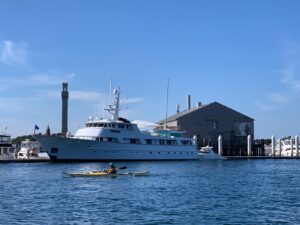
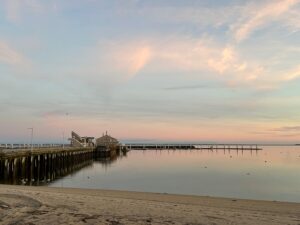
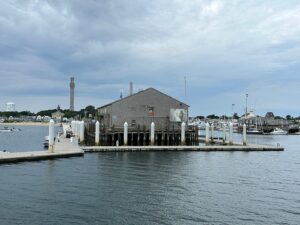
 PROVINCETOWN — The much quieter than normal waterfront businesses are anxiously waiting to see what Gov. Baker does with the current stay-at-home and social distancing policies. It has given boat owners plenty of time to do all those little jobs on their boats they never had time for in a typical spring. Given Boston’s cancellation of all outdoor summer events, it’s hard to believe Cape towns will go the opposite way.
PROVINCETOWN — The much quieter than normal waterfront businesses are anxiously waiting to see what Gov. Baker does with the current stay-at-home and social distancing policies. It has given boat owners plenty of time to do all those little jobs on their boats they never had time for in a typical spring. Given Boston’s cancellation of all outdoor summer events, it’s hard to believe Cape towns will go the opposite way.